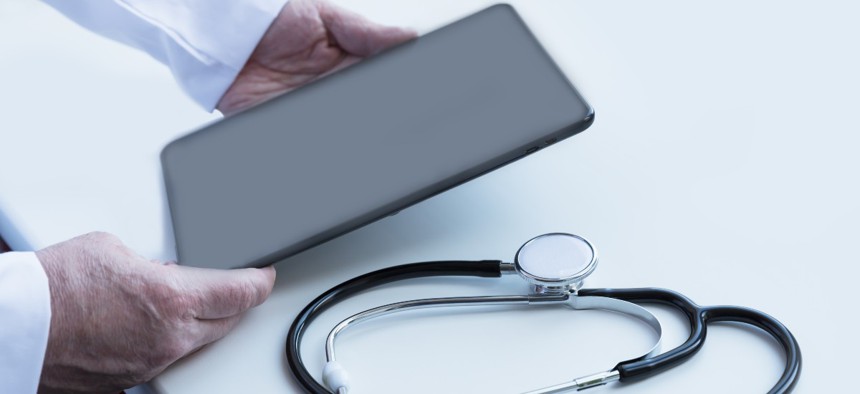Over 20,000 Veterans Received VHA iPads but Never Used Them for Virtual Care

Yulia Naumenko/Getty Images
An inspector general review found that the agency was also slow to get devices back so they could be redistributed.
The majority of veterans who received iPads through the Veterans Health Administration’s “digital divide” consult program never used them for video appointments and staff were slow to retrieve and redistribute the devices, according to a report conducted by the Department of Veterans Affairs’ Office of Inspector General.
The OIG report—which focused on the first three quarters of the 2021 fiscal year—found that VHA distributed iPads to roughly 41,000 patients, but approximately 51% of veterans who received the devices did not use them to connect to video telehealth services.
“An estimated 10,700 patients never had a VVC appointment scheduled, as there was no requirement to schedule, and neither the patient nor the staff initiated scheduling a VVC appointment,” the report said. “The review team estimated that more than 10,000 patients had a VVC appointment scheduled but did not complete the VVC visit for various reasons, such as technical issues or a cancelation, and a subsequent VVC appointment was not completed.”
VHA initiated the digital divide consults and device distribution efforts in August 2020 to help patients virtually connect with health providers during the coronavirus pandemic. The program identifies patients who lack internet access or video-capable devices but could still benefit from telehealth services. Eligible veterans receive an iPad with a Verizon Wireless or T-Mobile data plan, which allows them to receive video health services through VA Video Connect.
The report noted that device retrieval efforts and other operating procedures were impacted by the pandemic’s strain on VHA staff, “which required an urgency of decision-making to address critical veteran access needs and affected the prioritization of efforts in the program office and at the medical facilities.” These disruptions, along with the fact that VHA “did not establish clear oversight rules and responsibilities” for medical staffers or require staff to schedule appointments for patients who had received iPads through the program, slowed efforts to reclaim unused devices for use by other veterans.
Although VHA staff were required to retrieve unused iPads from patients if they were not used to access or schedule telehealth services for more than 90 days, the report found approximately 11,000 unused devices that met the criteria had not been reclaimed. A subsequent review of the total number of unused devices, conducted by OIG in November 2021, found that nearly 8,300 iPads still remained unrecovered, resulting in “about $78,000 in additional cellular data fees during the period under review.”
In addition to a protracted device recovery process, the OIG report also found that there was a backlog of roughly 14,800 returned iPads awaiting refurbishment before they could be redistributed to other patients. Another 3,119 patients were found to have received multiple devices. In December 2021, the report noted, VHA purchased an additional 9,720 iPads for the program for $8.1 million, despite the fact that other returned devices were still awaiting refurbishment or recovery.
“In total, the review team determined that VHA could have made better use of approximately $14.5 million in program funds with better device monitoring and retrieval controls and oversight,” the report said.
OIG offered VHA 10 recommendations for improving the program, including notifying VHA staff when a patient receives an iPad so they can be scheduled for a video appointment, implementing procedures to prevent patients from receiving duplicate devices and implementing “accessible and trackable reporting of devices waiting to be refurbished.”
In response to the report, VHA said that it concurred or concurred in principle with all 10 of OIG’s recommendations.






